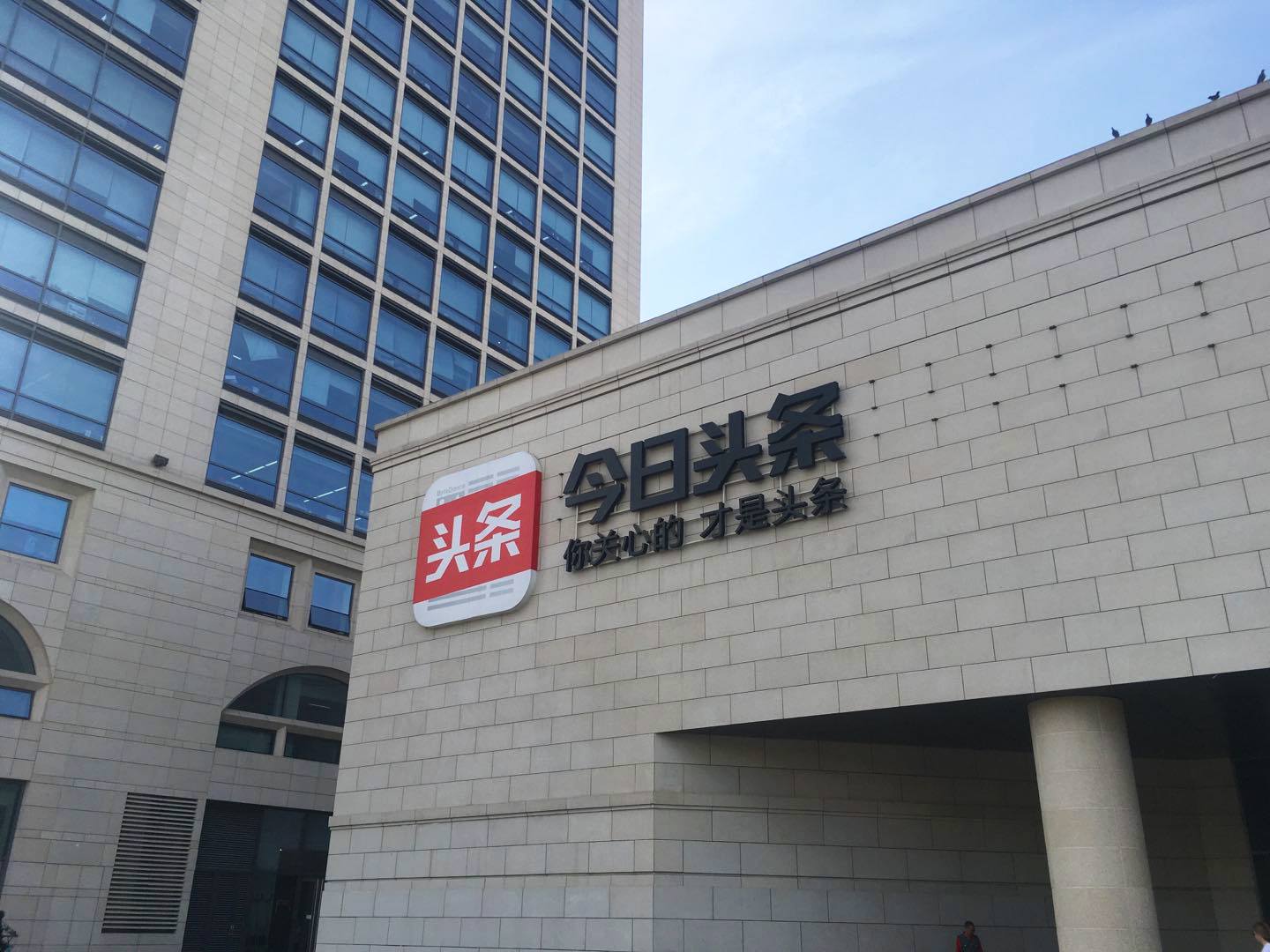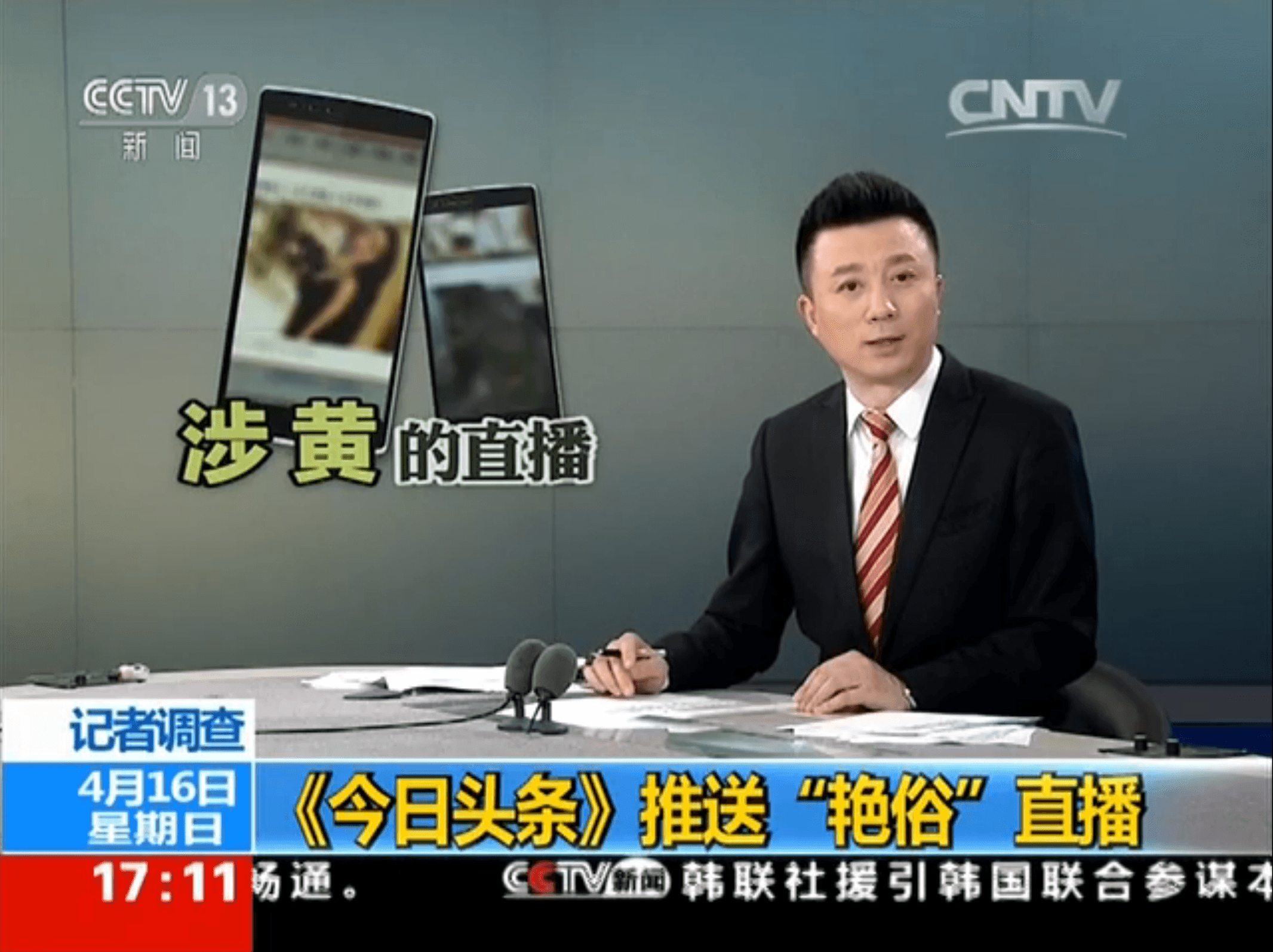
Toutiao headquarters in Beijing / Photo credit: Tech in Asia
As Chinese investors and entrepreneurs bet on artificial intelligence, the government is also busy plowing money and talent to turn the country into a world leader in AI. However, the technology could face a backlash once it touches a nerve with China’s ruling authority.
Last September, People.cn – the new media flagship of the party paper People’s Daily – published a series of editorials lambasting the news app Jinri Toutiao, which prides itself on using AI to make user recommendations from a myriad of news sources.
AI is a powerful tool to shape news selection, and the Chinese leadership wants to make sure it has a hand in deciding what people read.
Jinri Toutiao, which means “today’s headline” in Chinese, became a household name with its catchy tagline: “The only headlines are the ones you care about.” In its latest fundraising, Toutiao’s parent company Bytedance had set its sights on surpassing US$30 billion in valuation, a source told The Information last December. That would make the five-year-old startup about 10 times as valuable as the 166-year-old New York Times. However, Toutiao’s spokesperson told Tech in Asia that the company hasn’t determined its valuation yet.
The problem of Toutiao, the People.cn opinion piece says, is that it has allowed vulgar and clickbait content to flourish. “Whether the content gets to be displayed and whom it goes to relies solely on one rule by the machine: Is this something eye-catching? This simplified standard not only overlooks quality and diversity too easily but also increases the difficulty and cost of content auditing,” says one of the editorials.
See: China’s most addictive news app eyes world domination with AI feeds
The AI factor
In most cases, content in China falls under regulation for issues related to copyright and ethics – be it pornography, violence, or fake information. Media watchdogs also push for strict oversight during politically sensitive times to make sure that no one strays from core party values. Ahead of the Communist Party’s twice-a-decade reshuffle that happened last October, Toutiao archrival Yidian Zixun, along with conventional news portals like Sohu, NetEase, and Tencent, was summoned to private chats with internet regulators to work on “media cleansing.”
What’s new about the critique of Toutiao is the AI factor, with the semi-official media calling attention to the app’s “social responsibility” and the need for a human “editor in chief.”
“In any time, an ‘editor in chief’ cannot go missing in the process of content curation. A ‘doorman’ is required no matter how well the distribution channel works. Even in a time when technology is king, content cannot depend entirely on algorithms,” says the People.cn opinion piece.

China’s state broadcaster CCTV probed into the pornographic livestreams on several popular apps / Photo credit: Tech in Asia
“The issue here is that AI is potentially a very powerful tool to shape news selection, and the Chinese leadership wants to make sure it has a hand in deciding how and what people read,” suggests David Bandurski, co-director of the China Media Project and a fellow of the Robert Bosch Academy in Berlin.
“It’s not just about sensitive news coverage anymore. There is a tidal wave of choices out there now for information consumers, and the Party is as eager to ensure its message isn’t drowned out in a flood of entertainment content as it is to ensure that a damaging story is kept under wraps,” adds Bandurski.
It’s worth noting that while People.cn is a state-controlled media outlet, it’s also listed on the Shanghai Stock Exchange. This means the site not only acts as a party mouthpiece but is also subject to market forces – just like Toutiao is. The accusation against Toutiao, for example, “is one of those topics that could potentially go viral, given Toutiao’s popularity,” says a Beijing-based tech writer who prefers to be anonymous.
‘Low taste’
Following the denouncement, Toutiao responded with a letter vowing to improve its “imperfect machine learning technology.” The startup also stated that it had never actively sought to promote so-called “low-taste” content.
“We are always attacking [low-taste content] and clickbaits. In fact, the extremely vulgar content is all gone by now,” said Toutiao founder and CEO Zhang Yiming during an interview in 2016. From the onset, the startup has positioned itself as an AI instead of a media company; its aim is to distribute content rather than produce it.
“An editor would inevitably make decisions based on his personal preferences, but Toutiao doesn’t decide for users,” Zhang noted. “I think at the core of the debate is that Toutiao actually doesn’t profit from vulgar content. In fact, it harms our business.”
But “low taste” hasn’t prevented Toutiao from becoming an advertising darling. For 2017, the Beijing-based company is estimated to have pocketed US$2.5 billion in revenue. Most of it comes from advertisements that target its 200 million monthly users – that’s about one in every six people in China. With these impressive figures, Toutiao is on its way to change China’s online advertising arena, which for years has been dominated by the BAT tech trio — Baidu, Alibaba, and Tencent.
Censors: Human or AI?
However hard Toutiao tries to position itself as an AI purist, it eventually kowtowed to the censors. At the beginning of 2018, the firm posted a notice to hire 2,000 content monitors with a preference for Communist Party members, The Paper reported.
“Some of the censoring is due to violent or bloody content, most is due to administration order from Office of the Central Leading Group for Cyberspace Affairs,” says a former Toutiao employee, who requested anonymity. Toutiao keeps an internal WeChat group that informs the auditors of what is permissible on a daily basis, the source adds.
“Most big tech companies use a combination of automatic and manual censoring,” observes Ken Meng, who runs a Shenzhen-based social media marketing firm. “The machine censor keeps a list of banned keywords, which can be instantly detected as soon as someone uses them.”
See: Black boxes, human factors, and the unintended consequences of AI
Smaller companies outsource the censoring job to larger tech firms like Shanghai-based Qiniu Cloud. The company, which uses image processing algorithms to spot illegal content, claims it can replace over 80% of human auditors.
But combating other troublesome content such as fake news — which often makes headlines on Toutiao — isn’t as straightforward. As such, the startup is developing a duo of fact-checking bots to crush rumors.
“One is good at writing fake news, and the other is good at detecting whether or not this news is fake. And they compete with each other,” said Toutiao AI Lab head Ma Weiying at the company’s AI conference last December. The writer bot, Ma says, draws from Toutiao’s growing database of fake news stories, which are sourced from reports sent in by real people. It then goes on to train the detector by constantly feeding it with fake feeds.
Toutiao’s meteoric rise has encouraged traditional news outlets and startups to follow suit. China now sees more mobile content delivered by algorithms than by human editors, according to estimates by data firm Analysys. If the trend continues, machines will have a lot to learn as they operate in an increasingly strict media environment.
“It’s a tough job being a news aggregator in China,” says Charlie Smith, co-founder of GreatFire.org, a nonprofit organization that monitors which websites get censored in China. The AI-driven Yidian Zixun, for example, has hired Sohu’s former editor in chief to be the app’s gatekeeper. Regardless of how smart they are, future news apps – or any internet company that wants to thrive in China, for that matter – will need to constantly juggle between the country’s picky consumer tastes, esoteric regulations, subtle social norms, and the government’s unpredictable agenda.
This post China has a problem with Toutiao appeared first on Tech in Asia.
from Tech in Asia https://www.techinasia.com/chinas-problem-popular-news-app-toutiao
via IFTTT
No comments:
Post a Comment